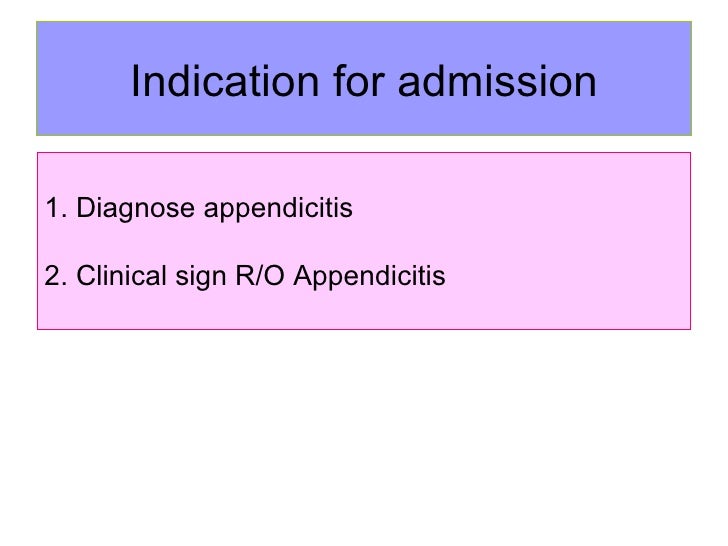Table of Content
Doctors usually order one or more tests to confirm if you have appendicitis. They will also collect your medical history and do physical examinations as part of the diagnosis process. Knowing the early warning signs for appendicitis is a very important process. Because inflammation in the body and in the area can spread the bacteria in your body more. Children's Abdominal Pain Abdominal pain in children can be more than just a tummy ache.
The diagnosis process for appendicitis may include a physical exam, collecting your medical history, and having tests and imaging. Your healthcare provider may order additional tests to rule out other medical conditions that may have similar symptoms to appendicitis. Your doctor may determine that you do have appendicitis. The only cure for appendicitis is to remove the appendix in a surgery called an appendectomy.
What are appendicitis tests?
The abdominal pain and the symptoms could be signs of appendicitis. How do you find out if you have an illness at home? If you experience abdominal pain when lying on your left side and extending your right hip, you can check to see if it’s related to your symptoms.

An alternative test for peritonitis is termed the "pinch-an-inch" test. This report describes two patients who presented with mild abdominal pain who subsequently were found to have appendicitis. In both patients, classic peritoneal signs were absent, but the pinch-an-inch test was positive.
Why do I need appendicitis testing?
If you have the typical symptoms of appendicitis, your GP will usually be able to make a confident diagnosis. When you press on your abdomen, is your finger able to sink in a bit? Or does your abdomen feel unusually firm and hard? There are many reasons for abdominal pain that don't need a visit to the emergency room. When in doubt, call or see your regular doctor for any abdominal pain that lasts more than 3 days.

The appendix is a small pouch attached to the large intestine. It's located in the lower right side of your abdomen. The appendix has no known function, but appendicitis can cause serious health problems if not treated. Your doctor also may order an abdominal or pelvic CT scan or X-rays. Doctors typically use ultrasound to diagnose appendicitis in children. Got health concerns you want to share with a doctor?
Symptoms & Signs
You'll usually notice symptoms within 12 to 18 hours, but they may last up to a week, becoming more severe as time goes on. If you're experiencing inflammation near your lower abdomen, you may have appendicitis. If you are diagnosed with appendicitis, you'll probably need surgery to remove your appendix, a small pouch extending off of your small intestine. This is considered a medical emergency, so it's important to know how to recognize the signs and get help as soon as you can.

Pain near the belly button is one of the earliest symptoms. If a doctor is unsure whether you have appendicitis, they may recommend waiting up to 24 hours to see if your symptoms improve, stay the same or get worse. If your symptoms are not typical, further tests may be needed to confirm the diagnosis and rule out other conditions.
Your GP will ask about your symptoms, look at your abdomen, and see if the pain gets worse when they press on the area around your appendix. If you have the typical symptoms of appendicitis, your doctor will most likely be able to make a confident diagnosis. During surgery, the surgeon may find that your appendix is normal. He or she may remove it anyway to prevent appendicitis in the future. Your surgeon may continue to look in the abdomen to find the cause of your symptoms.
If you do have peritonitis, your abdominal muscles will spasm when pressed. The doctor might also perform a quick rectal exam. Learn step-by-step what happens during laparoscopic appendectomy. Find appendectomy recovery time, early appendicitis warning signs, and what the appendix's functions are.
This can lead to peritonitis which is a spread of infection throughout the entire abdominal cavity. Another possibility is that the pus can be localised or present in a specific area. The other intestinal loops or fat within the abdomen can move towards this perforated appendix and form an abscess. Symptoms of appendicitis come on suddenly and intensify quickly. Pain may worsen when you move, take a deep breath, cough, or sneeze. Acute appendicitis is a severe and sudden condition, with symptoms usually developing over one or two days.

Your doctor will recommend an appendectomy if your appendix gets infected and inflamed and causes pain. If the infected appendix is not removed in time, it can turn into an abscess or burst and infect the entire abdomen . Both are life-threatening conditions and require urgent medical treatment. Call a doctor right away or get to a hospital’s emergency department if you have symptoms of appendicitis. The risk of the appendix bursting increases after the first 24 hours of symptoms, and if the appendix bursts, surgery to treat it is more complicated. My initial symptoms of appendicitis were loss of appetite, my stomach felt “off”, and I had pain in my left lower abdomen.

No comments:
Post a Comment